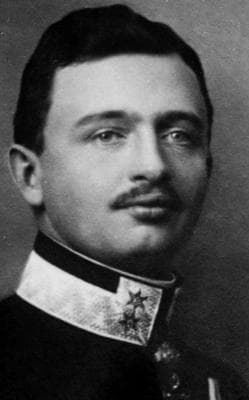
Blessed Charles Of Austria
Blessed
Feast Day: October 21
Birth: August 17, 1887
Death: April 1, 1922
Biography
Blessed Charles of Austria, also known as Charles of Habsburg, Karl IV von Österreich, or Carlo d’Austria, was born on 17 August 1887 in Persenbeug Castle, Melk, Lower Austria. He was the son of Archduke Otto and Princess Maria Josephine of Saxony, and a great-nephew of Emperor Francis Joseph I. From a young age, Charles received a strong Catholic education and developed a deep devotion to the Holy Eucharist and the Sacred Heart of Jesus.
A remarkable incident occurred in Charles' life when a stigmatic nun prophesied that he would suffer great attacks and adversity. In response, a group of people was assigned to pray for him at all times. This group later formed the League of Prayer of the Emperor Charles for the Peace of the Peoples (Gebetsliga Kaiser Karl für den V√∂lkerfrieden) after his death, and it became an officially recognized ecclesiastical prayer group in 1963.
On 21 October 1911, Charles married Princess Zita of Bourbon and Parma. Over the next ten years, they were blessed with eight children. With the assassination of Archduke Francis Ferdinand on 28 June 1914, Charles became the heir presumptive to the throne of the Austro-Hungarian Empire. Then, on 21 November 1916, upon the death of Emperor Francis Joseph, Charles ascended the throne as Emperor of Austria and was crowned apostolic king of Hungary on 30 December 1916.
During his reign, Charles viewed his position as an opportunity to implement Christian charity and social reform. He tirelessly worked towards peace and sought an end to the ongoing World War I. Charles was the only leader who supported Pope Benedict XV's peace initiatives. His diplomatic efforts aimed to bring an end to the war and alleviate suffering.
However, after the war, Charles was exiled to Switzerland in March 1919. Fearing the rise of Communism in Central Europe, he made two unsuccessful attempts to regain power in 1921. However, since he refused to be the cause of civil war, he ultimately gave up his efforts. Despite enduring exile, Charles never abdicated his throne or title, as he believed it was a mandate from God.
Charles and his wife, Princess Zita, lived in prayerful poverty on the island of Madeira, Portugal, following his exile. Charles saw his remaining days as an opportunity for spiritual contemplation and devotion. Sadly, Charles succumbed to pneumonia and passed away on 1 April 1922 in Funchal, Madeira.
After his death, Charles' widow, Princess Zita, dressed in black and lived in mourning for the remaining 67 years of her life. Her deep sorrow and dedication to preserving his memory are a testament to the profound impact Charles had on those around him.
Recognizing his exemplary virtues, Pope John Paul II venerated Charles on 12 April 2003, issuing a decree of heroic virtues. On 3 October 2004, Pope John Paul II beatified Charles, declaring him blessed. The beatification miracle was the remarkable cure of metastatic breast cancer in a Baptist woman from Kissimmee, Florida.
Blessed Charles of Austria, known for his unwavering faith, devotion to his people, and commitment to peace, continues to inspire the faithful around the world to this day.